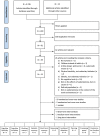Sedentary Behavior at Work and Cognitive Functioning: A Systematic Review
- PMID: 30234085
- PMCID: PMC6127206
- DOI: 10.3389/fpubh.2018.00239
Sedentary Behavior at Work and Cognitive Functioning: A Systematic Review
Abstract
Background: It is now well-established that sedentarity has a negative impact on the physiological functioning and health of humans, whereas very little is known about the psychological repercussions, especially in cognitive functioning. Yet, studying the cognitive effects of the sedentary lifestyle is particularly relevant in the short term for productivity and in the long term for cognitive health (accelerated aging). This systematic review therefore aims to make an inventory of the potential cognitive effects of sedentarity at the workplace. Methods: Pubmed, PsycINFO, Cochrane, Web of Science, and Scopus were searched for English-language peer-reviewed articles published between January 1, 2000 and December 31, 2017 to identify studies including sedentary behavior and objective measures from cognitive domains (cognitive inhibition, cognitive flexibility, working memory, etc.). To carry out this systematic review, the 3 keywords "Sedentary" and "Cognition" and "Work" (and their derivatives) had to appear in the title or in the summary of the paper. Results: Of the 13 papers that met the inclusion criteria, 9 were short-term interventions, 3 medium-term interventions, and 1 long-term intervention. Nine of them reported non-significant results. Two studies study reported deterioration in cognitive performance. Two reported an improvement in performance in cognitive tasks with one study with overweight adults and the only one study with a long-term intervention. However, these studies intend to reduce sedentary behavior, but do not allow answering the question of the potential cognitive effects of the sedentary lifestyle. Conclusion: These data suggest that sedentary behavior is not associated with changes in cognitive performance in interventions that intend to reduce sedentary behavior. Then, and given the trend toward increased time in sedentary behavior, long-term prospective studies of high methodological quality are recommended to clarify the relationships between sedentary behavior and the cognitive functioning. Our systematic review identifies also the need for retrospective, longitudinal, or epidemiologic studies. It also recognizes the need to standardize methodology for collecting, defining, and reporting sedentary behavior and the need to standardize the cognitive tests used. The relationship between sedentary behavior and cognitive functioning remaining uncertain, further studies are warranted for which 8 recommendations are proposed.
Keywords: cognition; cognitive functioning; sedentariness; sedentary behavior; work.
Figures
References
LinkOut - more resources
Full Text Sources
Other Literature Sources
Miscellaneous


